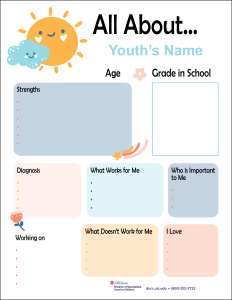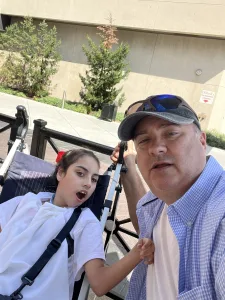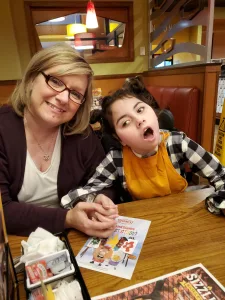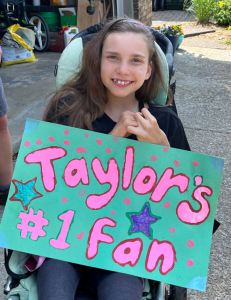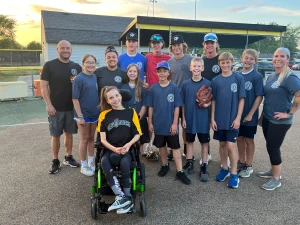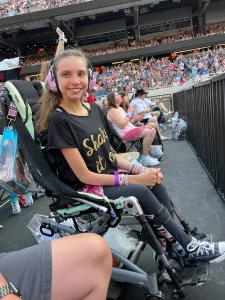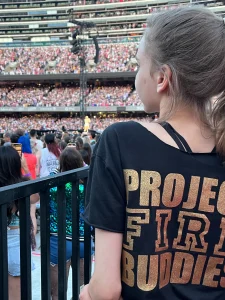Former DSCC Participant Connects Youth with Hearing Loss to Services and Support
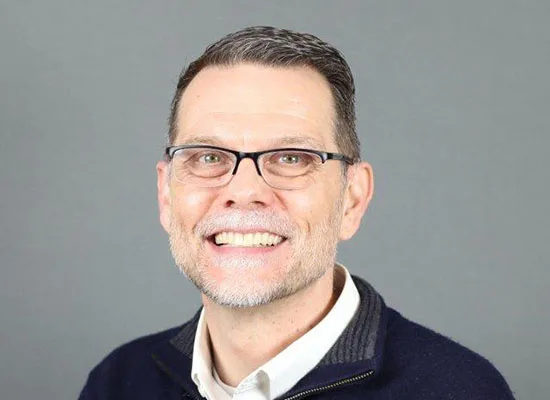
Todd Williams received Division of Specialized Care for Children (DSCC) support growing up and now leads the Evaluation Center at the Illinois School for the Deaf
Todd Williams has come full circle.
Todd, 53, grew up with hearing loss that wasn’t diagnosed until late in his childhood. He enrolled with the University of Illinois Chicago’s Division of Specialized Care for Children (DSCC) and a new world of access opened to him.
That access and support led him to a career that’s opening doors and opportunities for countless other Illinois families of children who are deaf or hard of hearing.
Todd is currently the Evaluation Center Director at the Illinois School for the Deaf (ISD). In this role, he helps school children with hearing impairments all over Illinois receive the right assessment, enrichment and intervention services.
Todd also speaks with parents during the annual Institute for Parents of Preschool Children Who Are Deaf or Hard of Hearing on the ISD campus in Jacksonville each June. The Institute is a partnership of DSCC, the Illinois School for the Deaf and other sponsors. It provides valuable education, resources and connections to families of young children with hearing loss in Illinois.
“My involvement with Parent Institute is just to be an advocate and tell them… ‘I’m a client of this program. So, please take advantage of the services that are out there,’” he said.
“The services don’t just come to you. You have to make an effort.”
Todd explains more about how he helps empower and inspire Institute families in the video below:
Todd says he is thankful for the support his family received when they needed it most.
He was in the sixth grade when his language arts teacher noticed something was “off” and mentioned it to his mother.
“Sometimes you don’t know what you don’t know until you do,” Todd said. “Once my hearing was tested, they couldn’t figure out why I was functioning so well! I remember being able to read lips. Even though I might not hear the bell ring, I could see what the other kids were doing and follow along.”
Todd said his hearing loss was mild to moderate at that time, and school wasn’t a struggle.
He was then diagnosed with bilateral sensorineural hearing loss, a condition where there is damage to the tiny hair cells in the inner ear (known as stereocilia) or to the nerve pathways that lead from your inner ear to the brain.
“We don’t know what caused my hearing loss, but I was sick a lot as a young child with allergies and ear infections,” Todd said. “I must have had hearing at some point because I know what letters and other sounds should sound like, so my speech wasn’t greatly impacted.”
He attended public school during the recession of the 1980s, and money was tight for his family as they started researching how to best support his hearing loss.
“The economic situation was terrible, and probably everybody in town was getting or needed some sort of assistance,” Todd explained.
His mom attended a town meeting about available services, and a woman told her about DSCC.
“That was back when DSCC was called the Division of Services for Crippled Children,” Todd said. “Thankfully, the name has changed, inclusion is growing, and the woman impressed on my mom that DSCC could help.”
For 87 years, DSCC has partnered with Illinois families to help connect children with special healthcare needs – including hearing loss – to the services and resources necessary to reach their full potential.
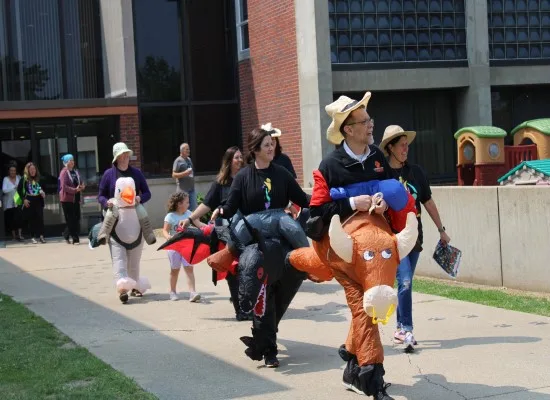
Thanks to DSCC, Todd began to see audiologists and providers who could help. He also received financial support for the cost of his first hearing aid. (DSCC can provide financial assistance for some eligible medical expenses when families meet certain income guidelines.)
“Having my hearing aid was access. We would have found the money somewhere, but it would have been an incredible hardship,” Todd said. “It was no coincidence that things fell in line. With DSCC it was amazing, perfect timing. That’s the beauty of it.”
Later, when his family moved, DSCC went with them.
“No matter where you go in Illinois, DSCC is there,” Todd said. “They were there to help my family with appointments and hearing aids. I got a second hearing aid when I was a sophomore and getting closer to aging out of the program.”
Todd later started planning for college. He took a placement test at John A. Logan Community College in Carterville. While there, a gentleman saw his hearing aids and gave him contact information for the Division of Rehabilitation Services (DRS or DORS) program.
“DORS helps individuals with disabilities become independent, productive citizens. They helped me through school, and I got my master’s at no cost,” Todd said.
He attended Illinois State University and earned a bachelor’s degree in teaching deaf and hard-of-hearing students. He later earned his master’s degree in counseling as well.
Over the years, Todd has worked in education and counseling and served as a deaf/hard of hearing consultant for the state. He also progressed from being hard of hearing to deaf. Todd now has cochlear implants, which unlocked a new world of sounds for him.
He became ISD’s Evaluation Center Director in December 2020. He says he enjoys empowering families and serving as a role model for youth with hearing loss.
“I had a little kid come up to me in the dining hall who was all excited because I had two implants just like him,” Todd said. “So, there’s the role model part, too, which is important for our kids to see that adults do walk around with these (implants), and they are successful.”
Todd encourages families of young children with hearing loss to attend the Institute and learn how ISD, DSCC and other state programs can benefit their children and families.
“Don’t miss out on a chance when you can really gain the most comprehensive evaluation for your child, and the resource list will be phenomenal,” Todd said.
“You have the ability to ask questions, to get questions answered that maybe you’re not feeling comfortable with asking in another setting. That’s what we’re here for. We’re here to answer questions and become a resource for you so the programing for your child can be the best that it can be. That’s our goal.”
New Youth Advisory Council for Teens and Young Adults With Special Healthcare Needs
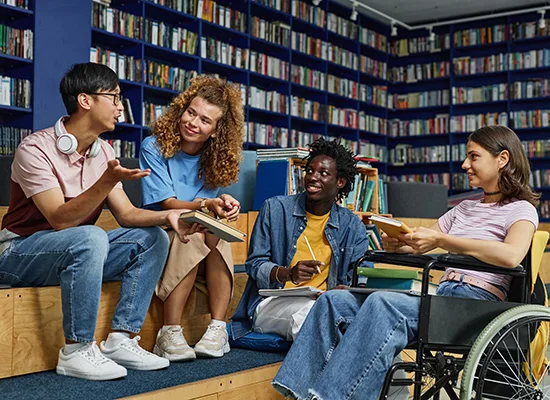
An opportunity for youth to help improve transition support and make a difference!
Youth with special healthcare needs should have a big role in shaping their future and helping improve support for others.
We want to hear from teens and young adults about what’s important and helpful to them as they plan for the future. Our new Youth Advisory Council is a great opportunity for them to share their input and make a difference.
The Youth Advisory Council (YAC) is a diverse, youth-driven group that aims to develop more youth-focused ways to help individuals and families with transition planning, resources and services.
The YAC’s goal is to support positive outcomes in adulthood for all Illinois youth with special healthcare needs in the areas of:
- Employment
- Health care
- Independence
- Quality of life
The YAC’s role is to:
- Bring a different and personal perspective on issues important to youth.
- Partner with the Division of Specialized Care for Children (DSCC) to help develop more youth-focused methods to enhance care coordination.
- Develop strategies to improve communication between youth/young adults and older adults.
Members participate in four virtual meetings per year.
Who is Eligible to Join the YAC?
The YAC is open to youth with special healthcare needs who are:
- Ages 15 to 24
- Living in Illinois
- Planning for the transition to adulthood in the areas of education, health care, employment and home and community-based support
Youth do not have to be a DSCC participant to join the council.
How to Join and Learn More
Members must complete an online application to join. (The application is also available in Spanish.)
Visit our Youth Advisory Council page for more information and answers to frequently asked questions.
You can also see the YAC flyer for more details:
If you have questions, please contact Claire Cook, DSCC’s Title V Program Transition Specialist, at clairer3@uic.edu or (800) 322-3722, ext. 21812.
Inclusive Summer Camp Programs for All Ages
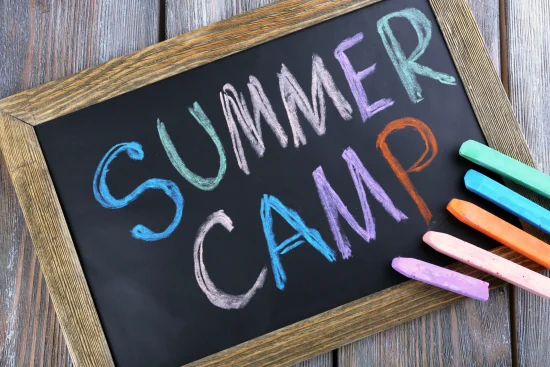
Our list of camps and activities all over Illinois can help you find the right fit for your child
Summer and the long break from school are right around the corner!
The good news is there are a variety of programs throughout the state to help keep your children engaged and learning.
We’ve gathered a list of day and overnight camps as well as virtual programs for youth of all ages with disabilities and special healthcare needs.
Does your child want to make new friends? Develop new skills? Meet others with their same condition or become more independent?
Our 2024 summer camp list can help you find the right fit.
There are several ways to search the camp opportunities on our website:
- Use the search box and filter option on our Events page to search for camps and other related keywords and locations
- View our full 2024 summer camp list
- Use our Events Calendar view to see summer camps listed by date
These camps are accessible and inclusive for a variety of ages and needs, including many of our program’s eligible medical conditions.
Please note that program deadlines vary, and some camps fill up quickly.
Know of a good summer camp opportunity to add to our list?
Send us the details at dscc@uic.edu. We’ll continue to update our list of camps and activities, so please check back often!
Free Tax Help for Illinois Residents With Disabilities, Others in Need

Programs offering free tax preparation and help filing tax returns are available to eligible individuals and families across Illinois.
People with disabilities, families with low income, taxpayers who speak limited English, and individuals over the age of 50 can receive tax help through in-person and online programs.
Many of the programs will provide help through April 15, the deadline for filing your 2023 tax return. The type of services and programs available will vary by region.
The Internal Revenue Service’s (IRS) Volunteer Income Tax Assistance (VITA) and Tax Counseling for the Elderly (TCE) programs offer free basic tax return preparation to qualified individuals.
VITA sites offer free tax help to individuals, including:
- People who genrally make $64,000 or less
- People with disabilities
- Taxpayers who speak limited English
- People 60 years of age or older
The AARP Foundation Tax-Aide Service focuses on providing in-person and online tax help to people over the age of 50 or who have low-to-moderate income. You do not need to be an AARP member to receive assistance.
The AARP Tax-Aide Site Locator can help you find a site where an IRS-certified volunteer can help you prepare and file your taxes.
Tax-Aide also offers free virtual coaching and software for state and federal returns if you prefer to do your own taxes. You must:
- Have an income between $16,000 and $79,000
- Be an active-duty military member making $79,000 or less
In the Chicagoland area, taxpayers can also access the Ladder Up Tax Assistance Program (TAP). The program provides free basic tax return preparation for:
- Families earning up to $64,000 and individuals earning up to $32,000 per year
- Full-year Illinois residents
You can also contact your local library and government offices for information about free tax preparation services in your area.
2024 Health Insurance Education Webinar Series for Families Kicks Off in March
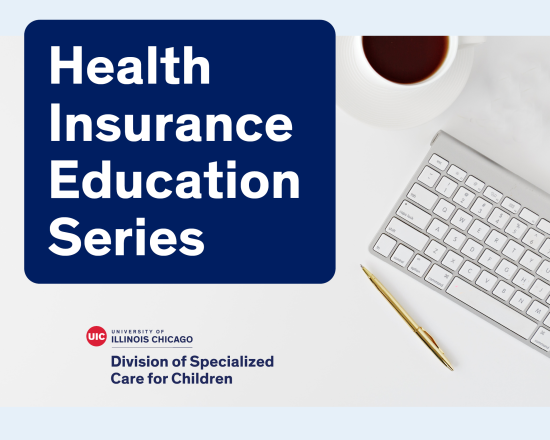
Free virtual training sessions for Division of Specialized Care for Children participants, their families and anyone interested in learning more about health insurance topics
Is figuring out your health insurance leaving you confused, frustrated or both?
Change your confusion to confidence with the University of Illinois Chicago’s Division of Specialized Care for Children (DSCC) Health Insurance Education Series.
These free trainings can help you better navigate your health insurance coverage and benefits. Each month, DSCC team members and other presenters will explain a different topic.
Each presentation will be in English. A Spanish interpretation line will be available during each session.
Check out the topics, mark your calendars and register for each session you’re interested in attending.
The session descriptions are in English followed by Spanish:
- Social Security Benefits, March 12 at 6 p.m.
- This training will help you understand Social Security benefits. Presenters from the Social Security Administration will share information about Supplemental Security Income and Social Security Disability Insurance. You will learn who can get benefits and how to apply for benefits. It will also cover what the Social Security program benefits are and how to keep your benefits.
- See the Social Security flyer for more details.
- Register on Zoom for Social Security Benefits
- Medicaid Denials, April 9 at 6 p.m.
- This training will help you understand Medicaid denials. It will review the common reasons that Medicaid denies services, such as equipment. The presentation will also share tips on how to avoid denials and what to do if Medicaid denies your services. This training will be for those with regular Medicaid and those enrolled in a managed care plan (MCO).
- See the Medicaid Denials flyer for more details.
- Register on Zoom for Medicaid Denials
- Transitioning Health Insurance Benefits to Adulthood, May 14 at 6 p.m.
- This training will help you understand how to transition health insurance benefits to adulthood. It will go over different insurance types, including Medicaid, Medicare and private insurance. This presentation will help you know what to start thinking about for health insurance benefits as you or your child nears adulthood.
- See the Transitioning Health Insurance Benefits to Adulthood flyer for more details.
- Register on Zoom for Transitioning Health Insurance Benefits to Adulthood
- Beneficios de Seguro Social, 12 de marzo a las 6 p.m.
- Esta capacitación lo ayudará a entender los beneficios del Seguro Social. Los presentadores de la Administración del Seguro Social compartirán información sobre el Seguro de Ingreso Suplementario y el Seguro de Incapacidad del Seguro Social. Aprenderá quién puede obtener beneficios y cómo solicitarlos. También cubrirá cuáles son los beneficios del programa de Seguro Social y cómo conservar sus beneficios.
- Consulte el folleto de Beneficios de Seguro Social para obtener más detalles.
- Enlace para registrarse
- Negaciones de Medicaid, 9 de abril a las 6 p.m.
- Esta capacitación lo ayudará a comprender las negaciones de Medicaid. Revisará las razones comunes por las que Medicaid niega servicios, como equipos. La presentación también compartirá consejos sobre cómo evitar negaciones y qué hacer si Medicaid niega sus servicios. Esta capacitación será para quienes tienen Medicaid regular y quienes están inscritos en un plan de atención administrada (MCO).
- Consulte el folleto de Negaciones de Medicaid para obtener más detalles.
- Enlace para registrarse
- Transición de los beneficios del seguro médico a la edad adulta, 14 de mayo a las 6 p.m.
- Esta capacitación lo ayudará a comprender cómo hacer la transición de los beneficios del seguro médico a la edad adulta. Tratará diferentes tipos de seguros, incluidos Medicaid, Medicare y seguros privados. Esta presentación le ayudará a saber en qué empezar a pensar en cuanto a los beneficios del seguro médico a medida que usted o su hijo se acercan a la edad adulta.
- Consulte el folleto de Transición de los beneficios del seguro médico a la edad adulta para obtener más detalles.
- Enlace para registrarse
You can also download a flyer with all the Health Insurance Education Series topics and registration links. (The flyer is also available in Spanish.)
The webinars are open to DSCC participants, their family members and anyone interested in these topics.
This is the second year for the DSCC Health Insurance Education Series. It began in response to DSCC families’ questions and suggestions from our Family Advisory Council.
Details about each series session are also posted on our Events page.
The 2024 Health Insurance Education Series is free for all attendees.
If you miss a session, you can access the recordings and related materials on our Family Education Webinars page.
If you have questions about these webinars before or after a session, email dscc@uic.edu or call (800) 322-3722.
We look forward to seeing you online!
Project to Improve Mental Health Support Benefits DSCC Teens
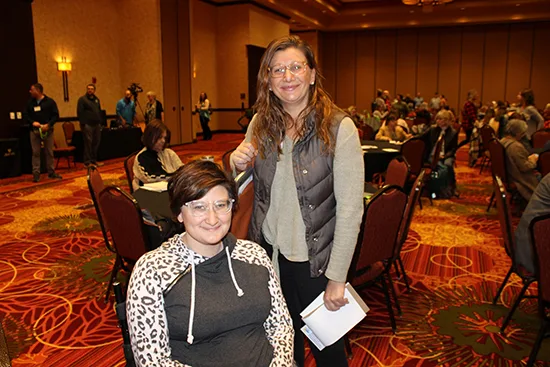
The B.E.S.T. study looks at how care coordination services that include mental health support can help teens with intellectual and developmental disabilities.
The teenage years can be a challenging time for all teens, including teens with intellectual and developmental disabilities (IDD).
Is your teen or young adult feeling sad, stressed or overwhelmed?
Consider joining the B.E.S.T. study. B.E.S.T. stands for Behavioral Health Stratified Treatment (B.E.S.T.) to Optimize Transition to Adulthood for Youth with IDD.
The B.E.S.T. study wants to know if care coordination services combined with mental health programming can help teens with IDD live happier and healthier lives.
All Division of Specialized Care for Children (DSCC) participants receive care coordination services. B.E.S.T. study participants receive access to additional behavioral and mental health resources and support.
DSCC participant Lily Kohtz, 19, (pictured on the left in the above photo) says her mental health has improved since taking part in the B.E.S.T. study.
Lily has spina bifida, uses a wheelchair and has difficulty with anxiety and depression due to her disabilities.
“I think a lot of people don’t connect anxiety or depression to having a disability,” she said. “The B.E.S.T. study has helped me talk about these things. We all have bad days, but depression is worse. Understanding how disability and mental health are tied together and having strategies to use to help me cope has really helped me.”
Lily says she’s enjoyed the online group sessions, where she now meets monthly with four other teens and a group leader. All meetings are confidential.
“We go over coping strategies such as controlling your thoughts and getting rid of the negative. I frequently use the skills we’ve learned and feel like my mental health has improved,” she said.
Lily’s mom, JoAnn Watkins (pictured on the right in the above photo), agrees that the study has benefitted Lily in many ways.
“I’ve seen a positive difference in Lily since she started with the B.E.S.T study. She’s using the skills she’s learned, and you can really see the improvement in her attitude and overall mental health.”
The study began recruiting participants in late 2022. More than 250 DSCC participant families have enrolled in the study so far.
Eligible DSCC participants must be enrolled in DSCC’s Core Program or Connect Care Program. (Please note that DSCC teens enrolled in the Home Care Program are not eligible to participate.)
The B.E.S.T. study is a free and voluntary project. Teens can join the study if:
- They currently have a DSCC Care Coordinator and are enrolled in DSCC’s Core or Connect Care programs.
- They are between 13 and 20 years old.
- They have an intellectual or developmental disability.
- They can comprehend at a fourth-grade or similar level.
- They can read and speak English.
- They have a computer, tablet or smartphone they can use to access the internet.
- They have permission from their parent, caregiver or guardian (if they are under 18).
The B.E.S.T. study team developed the project with input from a group of B.E.S.T. Study Scholars. These scholars are teenagers with IDD who tested and reviewed all of the B.E.S.T. study materials.
Teens who join the study are put into one of two groups:
- Group A receives care coordination services as usual from their DSCC Care Coordinator.
- Group B receives care coordination services and mental health support from the B.E.S.T. team. This support is based on each teen’s needs and can include:
- Mental health education
- Online group sessions
- Caregiver education and support
The study is a virtual program that will continue recruiting through December 2025.
The B.E.S.T. study is a partnership between DSCC and the University of Illinois Hospital and Health Sciences System (UI Health), the University of Illinois Chicago’s (UIC) Department of Disability and Human Development and the UIC Department of Pediatrics.
The principal investigators are Dr. Benjamin Van Voorhees and Dr. Kristin Berg.
The B.E.S.T. study team includes mental health professionals from Illinois, California and Massachusetts. They are all working together to find a way to promote the health and well-being of teens with IDD.
You can learn more information for both teens and parents/caregivers on the B.E.S.T. study website.
If you would like to join the study or have questions, please email the B.E.S.T. study team at beststudy@uic.edu or call (833) 732-5778.
If you choose to join, you and your family can support research that helps other teens and families.
Both parents/caregivers and teens must agree to be in the study. (Note that if a teen is their own legal guardian, they can participate alone or with a parent/caregiver if they choose.)
Those who join will be compensated for their time.
We’re excited to continue our partnership on this important research project!
Introducing “All About Me” Pages to Highlight Your Child’s Strengths, Needs and More
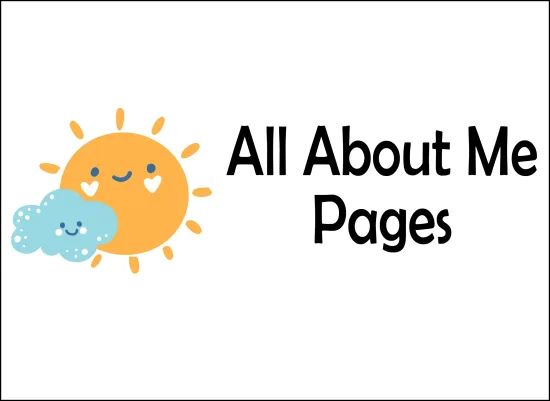
We’ve created free templates you can personalize to help doctors, schools and others get to know your child
It takes a village to care for children and youth with special healthcare needs. Parents and caregivers must partner with many different team members — specialists, nurses, therapists, educators and so on — to help their children reach their full potential.
Ensuring everyone understands your child and their unique needs can be exhausting. We want to help make it easier to share your child’s strengths, wants, goals and more.
We’ve created “All About Me” Pages that you can personalize to help anyone get to know your child. These free templates highlight what works best for your child, what they like and dislike and who they are as a person.
There are a variety of designs to choose from to help you capture your child’s personality and what makes them unique.
Visit the new “All About Me” Pages section of our website to see the templates and learn how to customize them for your child.
Our “All About Me” Page templates are available for anyone to download and customize.
If you are a Division of Specialized Care for Children (DSCC) participant and need help using the templates, please contact your Care Coordinator.
These pages are a result of feedback from our annual family surveys and our Family Advisory Council meetings.
We hope these pages can be helpful conversation starters with new doctors, nurses, teachers and other caregivers for your child.
Sensory-Friendly Holiday Happenings in Illinois
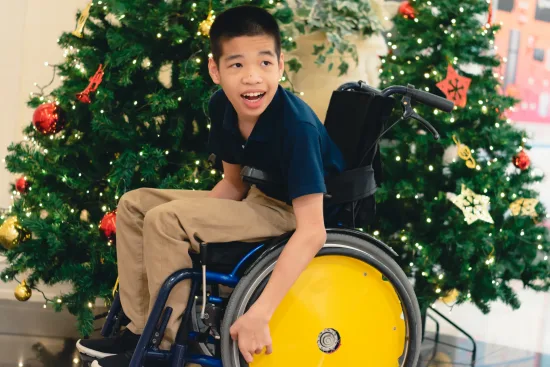
Fun, inclusive events the whole family can enjoy throughout Illinois!
How will you make memories this holiday season?
There are light displays, sensitive Santa opportunities, parades and more going on throughout Illinois.
Our Special Events page includes a roundup of opportunities designed specifically for youth with disabilities and special healthcare needs.
You can also browse this collection of special programs and event guides for opportunities to create some holiday magic and plenty of smiles:
- Autism Speaks and Cherry Hill Programs will provide sensory-friendly Santa experiences in Illinois and the St. Louis area on Dec. 3. These visits are free. Keepsake photo packages will be available for purchase. You must sign up to attend. Visit the Santa Cares website for a complete list of Santa’s stops. Be sure to select “Santa Cares”, “Caring Santa” or “Sensitive Santa” when checking your location. (Note some event dates and times may vary. Please check your location to confirm your date and time.)
- The National Federation of the Blind is offering letters from Santa and winter celebration letters in Braille to children who are blind or have low vision. The program is for children ages 10 and younger. Please complete the letter request form before Dec. 15. If you have any questions, call (410) 659-9314, ext. 2236, or email education@nfb.org.
- The Secret Sleigh Project is coordinating volunteers to provide in-home Santa visits to children who are medically fragile. Use the “Request a Santa Visit” form on the project’s website to request a visit.
- For families in the southern Illinois area, SI Families’ event calendar provides a great list of fun, seasonal activities. Other events in the area include Sensitive Santa at Heartland Regional Medical Center in Marion, the Carbondale Lights Fantastic Parade, and the DuQuoin Holiday Lights Fair.
- For options in central Illinois, check out these lists from ChambanaMoms.com and Springfieldmoms.org. Great places to see lights include Chatham Lights up the Park, Festival of Lights in East Peoria, and Mattoon Lightworks.
- For Chicagoland residents, WTTW Public Television, Chicago Parent Magazine and Kidlist have some great suggestions for things to do and see. Want to catch a show? Chicago Children’s Theatre features accessible weekends for children and their families.
- Don’t forget to check with your local zoos! The St. Louis Zoo and Lincoln Park Zoo will offer a sensory-friendly viewing option. Contact your local zoo to see what’s happening and when.
We will continue to add holiday events and activities, so please check our Special Events page often throughout the season.
If you know of a good sensory-friendly event to share, please email us at dscc@uic.edu.
Please note, the University of Illinois Chicago’s Division of Specialized Care for Children (DSCC) is not involved in organizing or scheduling these holiday events. If you have questions about a specific event, please contact the event sponsor or organizer.
DSCC Dad Helps Superheroes of All Abilities Unite in Southern Illinois
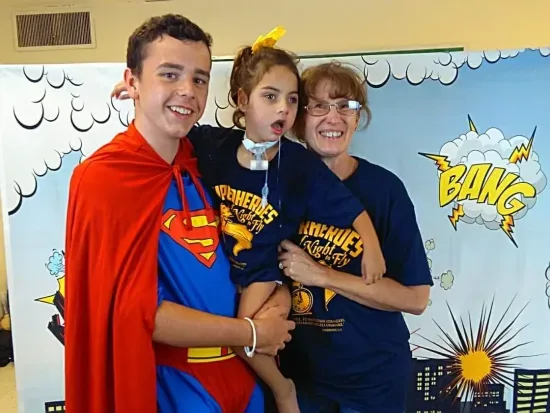
Pastor Tim Reynolds organizes the annual Special Needs Superheroes event to take place in Mount Vernon on Oct. 28
In Mount Vernon, superheroes of all kinds unite each year to bring joy to children and adults with disabilities.
Mount Vernon Baptist Temple’s annual Special Needs Superheroes event encourages individuals of all ages and abilities to dress as their favorite superhero and enjoy fall activities together. This popular free celebration returns for its fifth year on Oct. 28.
Pastor Tim Reynolds helped create the event and credits his wife, Melissa, and a dedicated group of volunteers with keeping it running. Reynolds’ daughter Isabella has complex medical needs and is a participant with the University of Illinois Chicago’s Division of Specialized Care for Children (DSCC).
Reynolds said the idea for the event came from a desire to serve his small community in southern Illinois.
“It can be hard for families and individuals with disabilities to go to a theme park. We have a church with a good layout, nice grounds, and a gymnasium,” Reynolds said. “I pastor two churches, and we decided to work together to create a special day for young and old alike that was as close to a carnival atmosphere as possible.”
Choosing a superheroes theme, the first event kicked off in 2018.
“I’m not sure why we chose the superheroes theme, but it fit, and it’s lots of fun. The first year we had about 400 attendees,” Reynolds said.
The event continued to grow each year except for a one-year gap in 2020 due to the COVID-19 pandemic.
“This year we’re planning for more than 800 guests. We have a bunch of folks who love Comic-Con. They have amazing costumes and travel from Missouri, Kentucky, Indiana and other places to help us year after year,” Reynolds said.
Volunteers from churches, 4-H clubs, government, and more serve as “buddies.” They help participants of all ages and abilities experience activities that include:
- A petting zoo and horseback rides
- Face painting and games
- Balloon tying with Rainbow the Clown
- Superhero photos
- Haircuts
- Brats, hamburgers, snow cones and popcorn
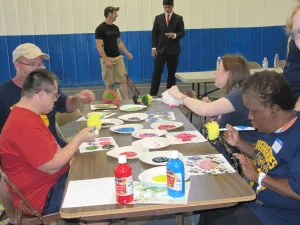
“It’s just a big kick. Some people like dressing up, others just like taking it all in,” Reynolds said. “I really love the horseback riding and seeing them with the animals. For some, it’s the first time they’ve ever ridden a horse or been able to touch and be up close to these animals. They’re so uninhibited in expressing their excitement and joy. You can’t help smiling all over.”
The guest list also includes community members and residents from area Community Integrated Living Arrangement (CILA) Homes.
The whole Reynolds family, including Isabella and her three older siblings, also take part in the fun.
Reynolds said his wife, Melissa, organizes all the details for the superheroes event. She prefers to remain in the background while he is “just the promoter and front man.”
“She is the rock of our family and works tirelessly caring for Isabella,” Reynolds said.
Isabella has Moebius syndrome, a rare neurological disorder that can cause paralysis, an inability to smile and other disabilities.
“We adopted her as a baby and the doctor said she wouldn’t live past a year old,” Reynolds said. “She’s a happy girl and recently turned 12.”
Isabella enrolled with DSCC shortly after birth and receives services through the Home Care Program. The Home Care Program helps children and young adults who need in-home nursing to safely live at home.
“We connected with DSCC at the hospital and really appreciate all that they do,” Reynolds said. “DSCC has helped us track down nursing services and medical equipment. They’re always there to help and are another go-to when you need help filling in the gaps.”
Members of our DSCC team from the St. Clair Regional Office will be at this year’s Special Needs Superheroes event to speak with families about our services.
The event takes place from 4 to 6:30 p.m. on Oct. 28 at Mount Vernon Baptist Temple, 817 Woodland Drive, in Mount Vernon. There is no charge to attend.
“Everything is completely free,” Reynolds emphasized. “There’s nothing better than the smiles and hugs you get from kids with sno-cone-covered faces. We started all of this to be a blessing to someone, but I think we, the volunteers, are truly the ones who go away blessed.”
See the Special Needs Superheroes flyer for more details or visit the Events section of our website.
If you’d like to attend, please call or text (618) 315-1111 to register. The deadline to sign up is Oct. 23.
Project Fire Buddies Helps DSCC Participant Attend Concert of Her Dreams
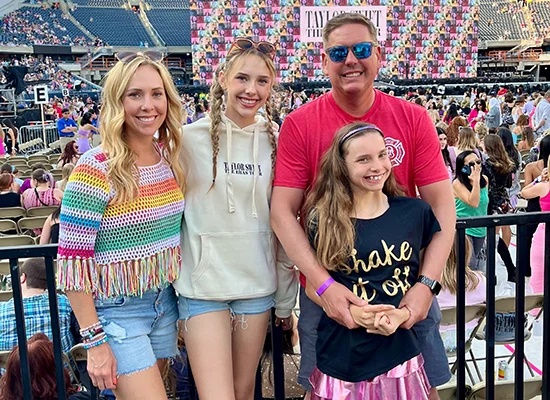
Lily Brown and her entire family saw Taylor Swift perform at Chicago’s Soldier Field
Lily Brown and her family experienced a whirlwind week earlier this month that they won’t soon forget.
The 14-year-old Oak Forest girl graduated from eighth grade. She then played in an adaptive Little League Challenger baseball game.
But the week’s biggest highlight was seeing Lily’s favorite artist Taylor Swift in concert at Soldier Field in Chicago on June 2.
“It was a very special week for all of us,” Lily’s mom, Jennifer Brown, said.
A nonprofit group of Chicago-area firefighters called Project Fire Buddies made the unforgettable concert experience possible.
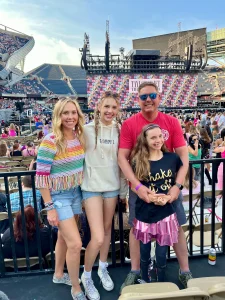
Lily has Rett syndrome, a rare genetic neurological disorder. The condition can severely affect abilities such as speaking, walking, eating and even breathing.
Lily has seizures and uses a wheelchair. Even though she doesn’t speak, she says a lot through her expressive eyes and huge smile.
She is also a participant with the University of Illinois Chicago’s Division of Specialized Care for Children (DSCC). DSCC partners with families to help them find the right services and resources for their child’s special healthcare needs.
In January, Lily turned 14. For her birthday present, Jennifer wanted to take her to see Taylor Swift, who announced her concert tour would include Chicago.
“I took her older sister, Grace, when she was about 9 years old to see Taylor Swift. It was a really special mother and daughter experience,” Jennifer explained. “I wanted Lily and I to have that same experience. Due to the pandemic, Taylor Swift hasn’t toured for a while.”
From the day the tour was announced, they searched for two accessible tickets nearly every day. But their search came up empty. Then, the Oak Forest Project Fire Buddies heard about Lily’s wish to see Taylor Swift.
The Oak Forest Fire Department created Project Fire Buddies in 2016. Its mission is to bring joy to kids struggling with serious illnesses and their families. Volunteers visit the kids throughout the year to deliver gifts for special occasions, play games, read books or just to say “hi” and spend time together.
“We love the fire buddies!” Jennifer said. “We’re so grateful for all that they do. They gave Lily a bike made specifically for her needs so that she can enjoy riding. This year, she’s also playing with the Challenger’s baseball team and enjoyed playing against the Project Fire Buddies team.”
Now, Project Fire Buddies has made Lily’s ultimate birthday wish come true and more.
“Our family usually has to use the divide and conquer approach. We don’t get to attend events together very often,” Jennifer said. “It was an incredible surprise to learn that our Oak Forest Fire Buddies chapter found tickets for our entire family and worked with Soldier Field to have the area accessible for Lily’s wheelchair. We were just blown away.”
Since no “Swifty” can go to a concert without bling, everyone made sure Lily had just what she needed for the big night.
“We made a cute ‘Shake it Off’ shirt with all the sparkle and bling any Swifty would be proud of,” Jennifer said. “We also made a sign, and friends also got her some flashy, light-up flare.”
The Brown’s had an amazing time – together – at the Taylor Swift concert.
“The show was incredible, and Lily loved it,” Jennifer said. “She did have a couple of seizures during the show but bounced back in time to catch her favorite song, ‘Shake it Off.’”
“Project Fire Buddies is hoping to expand to help more kids who are medically challenged or have life-threatening conditions,” Jennifer added. “The Oak Forest chapter is amazing and incredibly generous. They are an important part of Lily’s life, and we are so thankful.”
Visit our Resource Directory to learn more about Project Fire Buddies.
You can also read about the news coverage of Lily’s special concert experience:
Thank you to Project Fire Buddies for making Lily’s wish come true!



